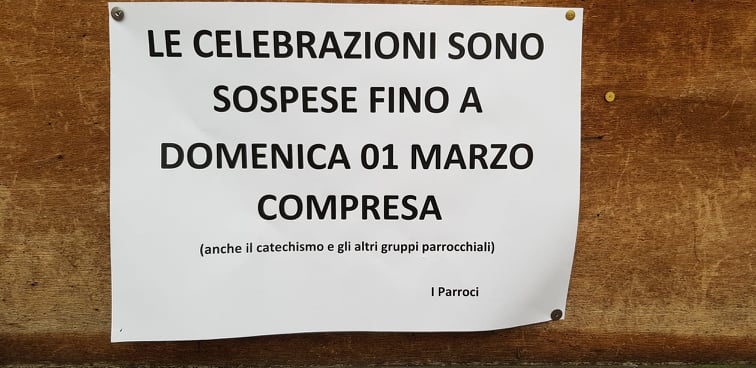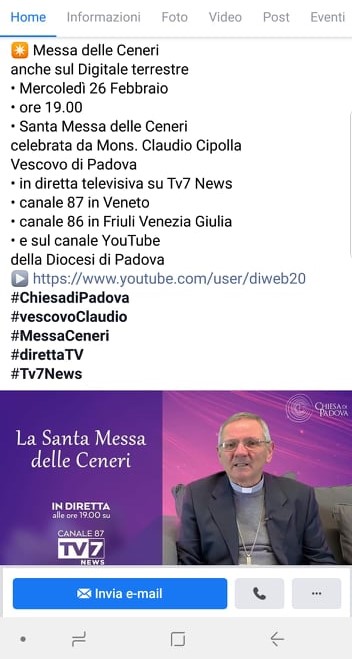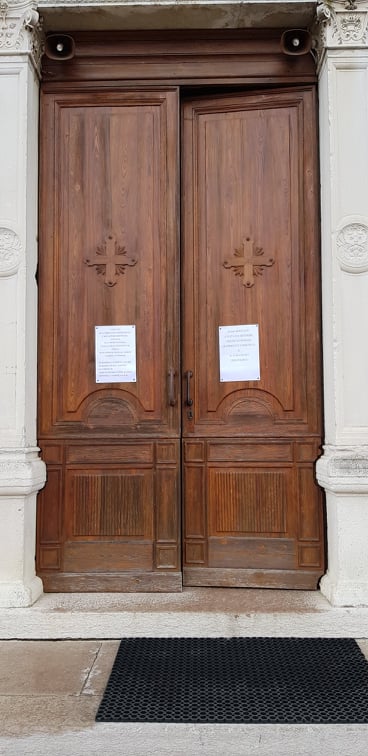Faith in a Time of Coronavirus

Journalists around the world are scrambling to follow the spread of COVID 19, also known as Coronavirus. The Wikipedia page for the 2019-20 Coronavirus Outbreak
already is nearly 40,000 words long, charting confirmed cases in dozens of countries worldwide. Wikipedia editors just added the first Brazil to the global list this week.
Most of the reporting in newspapers, TV and radio networks is about public health measures, including the closing or limiting of public events. Science reporters, government correspondents and health specialists all are regularly filing stories.
There is also a lot for religion journalists to cover because religious groups represent the world’s largest social networks. COVID-19 is having a dramatic impact on congregations around the world as religious leaders are scrambling to get news to followers. The Church of England published advice to its churches on February 17—and then updated that advice on February 26.
I Live in the Third Worst-Hit Country

I live in the Veneto region of Italy, about 120 km from the locked-down town of Vo’ Euganeo and 60 km from the nearest cases, and I can report first-hand that confirmed cases of the virus dramatically change life for people of faith. Measures to contain the outbreak of coronavirus are affecting everyday life, thus reshaping social and religious life.
With more than 400 cases and 12 deaths reported so far, Italy is the third worst-hit country in the world, after China and South Korea. The vast majority of COVID 19 cases were reported in Lombardy and Veneto, where eleven towns (ten in Lombardy and one in Veneto) were locked down in quarantine thus isolating 50,000 people in hotspots called the red zone
with police check-points monitoring the access to it. According to the Government’s guidelines, in Northern Italy schools, universities, museums, cinemas, theatres, sport centres are temporarily closed, public gatherings banned and major events cancelled or postponed. For the first time ever, even the world famous Venice Carnevale was suspended two days early.
Recommendations from dioceses add to the directions from the national and regional authorities disseminated on Sunday evening. Religious services, as well as church groups and any other activities and gatherings have been suspended in several parishes of Northern Italy this week. In Milan, tourist will not be able to visit the Duomo, Milan’s Cathedral, which was closed except for personal prayer, after the Archdiocese suspended Masses beginning in the evening of Sunday until further notice.
The Mass Behind Closed Doors

Ash Wednesday Mass was not cancelled, but was celebrated in a new and unusual way. While in Rome Pope Francis celebrated the Mass at a crowded church as usual, in Venice the liturgy was celebrated behind closed doors and recorded with a smartphone to be streamed online and broadcast by local and regional TV.
Thank you for this streaming. It makes us feel part of a community
, some faithful commented while watching from home.
It’s so moving
, another one commented.
There were many messages of gratitude on the Facebook page of the diocese’s weekly magazine. Like Venice, other dioceses opted for providing a video stream of the Mass behind closed doors using social media or Youtube. That was the choice in the Diocese of Padua. This year, Lenten season starts in an unexpected way, different from what we could imagine just a few days ago
, Bishop Claudio Cipolla wrote in a letter to parishioners.
All liturgical celebrations, including Sunday’s services and Stations of the Cross, have been suspended in most parishes until March 1.
Invocations to Our Lady of Health
S. Marco Basilica, the world-famous landmark in Venice, is closed to the public, Patriarch of Venice Archbishop Francesco Moraglia announced, calling the community to remain calm. He also entrusted the Church of Venice to the Our Lady of Health, who was invoked to protect the city from plague back in the 17th century. In his notice, Archbishop Moraglia asked believers to devote enough time to prayer and meditation with the support of the liturgy aired on radio and TV.
A Reminder of the Early Christian Church
Eight years ago, a community left without churches found themselves make Eucharist in parks or inside tents,
Italian theologian and author Brunetto Salvarani said in a Facebook post on Tuesday, recalling the earthquake that devastated Emilia Romagna region eight years ago. Salvarani said the situation reminds him of the early Christian church 2000 years ago: This year, because of coronavirus, we are marking the start of Lent with a scattered community, closed in their houses, like at the beginning of Christian message.
In a later post, he quotes Matthew 6:6 But you, when you pray, enter into your inner chamber, and having shut your door, pray to your Father who is in secret, and your Father who sees in secret will reward you openly.
Brunetto Salvarani’s reflections on this specific time took me back to religion writer David Crumm’s book Our Lent, an invitation to enjoy that combination of faith and self-guided reflection. Are Jesus’ teachings and path the answer to this change in times and to the way the new virus is affecting our religious and social life, making us feel anxious and lost?
I Miss the Community
While some measures were expected, it is hard for Catholic faithful to get used to the restrictions affecting their religious life. I would have never imagined they could close the church,
explained a man to journalists, standing incredulous in front of the entrance of the church where he regularly worships.
I really miss having a place to pray with other people,
a woman added. I used to come to the morning service and meet people there every Sunday. I miss the community, and I feel lost now.
Joshua Possamai, 29, who lives in the same town where I live and is very active in the parish said he is sad to see such extreme measures. I totally disagree with the decision to cancel the liturgies when most businesses, such as shops and public swimming pools, are open,
he said, expressing his disappointment for not being able to mark the starting of Lent as a Church, together.
Restrictions impacted his religious life. Bishops suggested we return to family prayer and increase personal prayer. That can actually be a good practice, which I often find hard to do. So, despite the sadness of not living the beginning of Lent as a community, there is something positive: feeling close to each other in prayer anyway, in everyday life.
Emptying Holy Water Fonts and Limiting Passing the Peace
Recommendations to priests in the areas where Masses are still being celebrated include to empty holy water fonts and give the Eucharist only in hand, while parishioners are exempted from shaking hands while passing the peace.
Public funeral liturgies are suspended and only close family members can attend. In some cases, only the blessing of the body is allowed.
Following CEI’s call to full collaboration with the competent State and Regional Authorities to contain the epidemic risk
, Muslim, Waldensian, Methodist and Baptist communities joined Catholic communities by closing mosques and churches and suspending services.
All communities shared Pope Francis’ expression of closeness to those suffering from the coronavirus and the health care workers who are treating them, as well as the civil authorities and all those who are working to help patients and stop the contagion.
UCOII, one of the most representative Muslim organizations in Italy, launched a collection to buy medical masks for people living in the hotspots, since masks rapidly sold out in Northern Italy.
Whereas it is not sure how long the restrictions will be effective, religious leaders are inviting believers to follow religious programming via radio and TV and to focus on other aspects of Lent, such as individual prayer, fasting and works of charity, and to reflect on the meaning of belonging to a community.
Share Your Thoughts with Other Religion Journalists
Do you live in an area affected by coronavirus? Are restrictions reshaping your religious life? Please share with us your experience.
